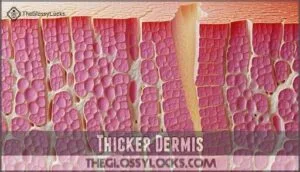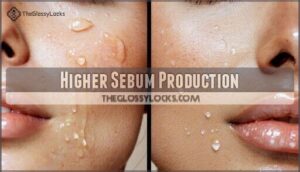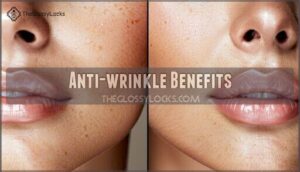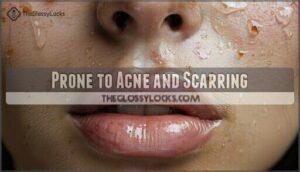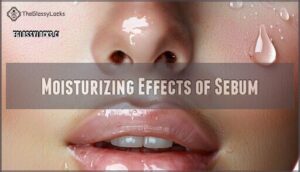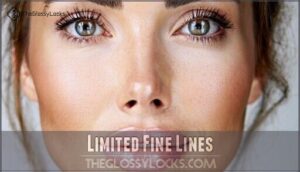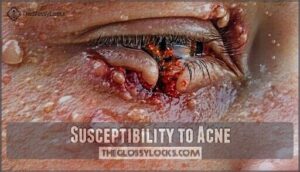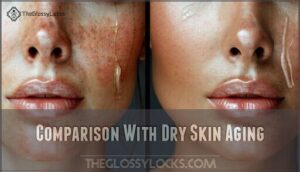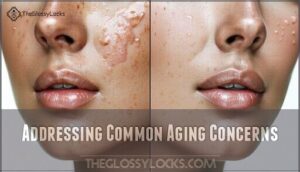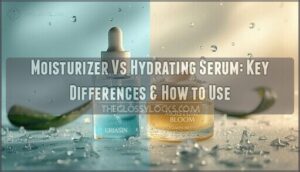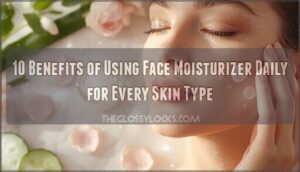This site is supported by our readers. We may earn a commission, at no cost to you, if you purchase through links.

Research suggests oily skin does age better than dry skin types. Your skin’s natural oil production acts like a built-in moisturizer, keeping your face plump and reducing fine lines.
The thicker dermis that comes with oily skin provides extra protection against environmental damage, while increased melanin production offers some defense against sun-induced aging.
However, there’s a catch – acne scarring can offset these benefits.
The aging game isn’t just about skin type though; genetics and lifestyle choices play vital roles.
Table Of Contents
- Key Takeaways
- Does Oily Skin Age Better?
- Oily Skin Characteristics
- Impact of Oily Skin on Aging
- Comparison With Dry Skin Aging
- Addressing Common Aging Concerns
- Factors Influencing Oily Skin Aging
- Frequently Asked Questions (FAQs)
- What does oily skin look like?
- Does oily skin help you age better?
- Does oily skin ages differently than other skin types?
- Is oily skin aging?
- Does having oily skin mean I’ll get less wrinkles?
- Does dry skin age better?
- Is it better to have oily or dry skin?
- Do you age slower when you have oily skin?
- Are there benefits to having oily skin?
- Which skin type ages faster?
- Conclusion
Key Takeaways
- Your oily skin ages differently than dry skin – you’ll develop fewer fine lines due to natural sebum acting as a built-in moisturizer, but you’re more likely to experience deeper wrinkles around your mouth and jawline over time.
- The thicker dermis that comes with oily skin provides extra cushioning and protection against environmental damage, helping maintain higher collagen density and skin elasticity as you age.
- While your skin’s natural oil production offers anti-aging benefits, acne scarring can offset these advantages – consistent skincare with salicylic acid and proper scar prevention is crucial for maintaining youthful skin.
- Your genetics and lifestyle choices matter more than skin type alone – daily SPF, proper hydration, diet, and environmental protection play bigger roles in how well your skin ages than oil production levels.
Does Oily Skin Age Better?
The age-old question about oily skin aging has a surprisingly nuanced answer. While you’ve probably heard that oily skin benefits include slower aging, the reality isn’t quite that simple.
Your skin’s sebum production does offer some protective advantages. This natural oil acts as a moisture barrier, helping maintain skin elasticity and potentially delaying fine lines. The thicker dermis common in oily skin types provides extra cushioning, making wrinkles less noticeable in certain areas.
However, genetic predisposition plays a bigger role than skin type alone. Your lifestyle impact – including sun protection, diet, and stress management – substantially influences how your skin ages. Environmental protection matters more than oil production in the context of preventing damage.
The truth? Oily skin vs dry skin aging differences exist, but neither type ages inherently "better." As sebum decline occurs naturally with age, even oily skin requires proper care to maintain its collagen production and overall health. A good start is to use salicylic acid cleansers to unclog pores and reduce sebum.
Oily Skin Characteristics
If you’ve got oily skin, you’re dealing with larger pores, a shiny appearance, and sebaceous glands that work overtime to produce excess oil.
Your skin’s thicker texture and higher sebum production create unique aging patterns that differ substantially from other skin types, offering both protective benefits and specific challenges as you age, particularly in terms of aging patterns.
Thicker Dermis
Your oily skin comes with a hidden advantage – a thicker dermis that acts like nature’s built-in anti-aging shield.
This extra thickness isn’t just for show; it provides genuine structural support that helps your skin age slower than other types.
Here’s what makes your thicker dermis special:
- Collagen density remains higher, maintaining skin firmness longer
- Elastin preservation keeps your skin bouncy and resilient
- Dermal hydration stays locked in more effectively
- Wound healing happens faster due to robust cellular activity
This skin thickness translates to real oily skin benefits – fewer fine lines and a more youthful appearance as you age.
Higher Sebum Production
Beyond thick skin lies another advantage: sebum production genetics work in your favor.
Your skin’s natural oil factory produces more sebum than dry skin types, creating built-in hydration that keeps your complexion plump.
This oily skin sebum acts as lipid environmental protection, shielding against pollution and harsh weather.
While sebum decline rate hits around age 40, you’ll still maintain more moisture than your dry-skinned friends.
This natural advantage helps explain why oily skin age slower overall.
Anti-wrinkle Benefits
Your skin’s natural oils pack surprising anti-aging power that many overlook.
Sebum and wrinkles have an interesting relationship – your natural oils actually help keep those lines at bay.
Here’s how oily skin antiaging works:
- Enhanced collagen production keeps skin structure strong and resilient
- Superior hydration levels maintain skin elasticity and prevent premature aging
- Improved scar healing helps repair damage more effectively than dry skin
This oily skin youthful advantage means wrinkles develop slower and less noticeably.
Your skin’s continuous moisture creates a protective barrier that supports long-term health, making oily skin age slower than you’d expect.
A good addition to a skincare routine is a gentle foaming cleanser.
Prone to Acne and Scarring
Those anti-wrinkle benefits come with a catch.
Your oily skin makes you more prone to acne breakouts, which can leave lasting skin scars that affect your skin texture.
Here’s what you’re dealing with:
| Acne Scarring Types | Impact on Skin Texture |
|---|---|
| Ice pick scars | Deep, narrow pores become visible |
| Rolling scars | Creates uneven surface appearance |
| Boxcar scars | Square-shaped depressions form |
| Post-Inflammatory Hyperpigmentation | Dark spots replace active breakouts |
| Keloid scars | Raised, thick tissue develops |
Acne Severity Impact varies, but Scar Prevention Methods help protect your complexion.
Impact of Oily Skin on Aging
Your oily skin’s natural sebum production acts as a built-in moisturizer, helping maintain plumpness that can reduce the appearance of fine lines as you age.
However, you’ll likely face different aging challenges, including potential acne scarring and deeper wrinkles in the lower face, rather than simply aging "better" than other skin types, with challenges such as deeper wrinkles.
Moisturizing Effects of Sebum
Your skin’s natural oil factory works overtime, but that’s actually good news for sebum hydration.
This natural emollients blend creates powerful lipid protection against moisture loss.
Think of sebum as your built-in moisturizer – it contains triglycerides and fatty acids that lock in skin moisture while providing environmental defense.
Your oily skin’s continuous oil production supports ongoing skin hydration and moisture retention, creating a protective barrier that keeps your complexion naturally plump.
Limited Fine Lines
The good news? Your oily skin fine lines aren’t as pronounced as you might expect.
Thanks to higher collagen production and increased skin thickness, oily skin creates natural padding that minimizes wrinkles.
Sebum and lines work together – your skin’s natural oils keep hydration levels ideal, which helps plump fine lines.
Larger pore size actually provides extra cushioning in areas like your forehead.
While oily skin wrinkles still develop with skin aging, they’re typically less visible than on drier skin types, giving you a smoother appearance overall.
Susceptibility to Acne
However, oily skin’s excess sebum creates perfect conditions for acne development.
Your larger pore size and increased breakout frequency can lead to inflammation and scarring potential that actually accelerates skin aging.
While sebum provides moisture benefits, persistent acne severity often results in texture changes and discoloration that make you appear older than your chronological age.
A good routine should include gentle salicylic cleansers to unclog pores.
Comparison With Dry Skin Aging
If you have dry skin, you’ll likely notice fine lines appearing earlier and more prominently than your oily-skinned friends.
Your thinner dermis provides less natural cushioning against wrinkles, while dry skin’s smaller pores can’t offer the same plumping effect that comes with oily skin’s thicker texture, particularly affecting the appearance of wrinkles.
Exaggerated Fine Lines in Dry Skin
While oily skin benefits from natural sebum protection, dry skin faces a different challenge entirely.
Your skin’s lack of moisture creates a perfect storm for accelerated aging. Fine lines become 3x more prominent around your eyes and mouth due to reduced skin elasticity and compromised barrier function.
| Aging Factor | Dry Skin Impact | Visible Result |
|---|---|---|
| Moisture Loss Impact | 25% faster dehydration | Crinkly Skin Appearance |
| Collagen Breakdown | 40% accelerated rate | Premature Aging Signs |
| Cellular Degradation | 60% faster process | Deep wrinkles formation |
| Elastin Fragmentation | Reduced resilience | Loss of skin elasticity |
| Barrier Compromise | 50% increased water loss | Enhanced Fine Line Prevention needs |
Dry Skin Hydration becomes critical for maintaining youthful appearance and preventing these exaggerated signs of skin aging.
Thinner Dermis in Dry Skin
Why does dry skin seem to age faster? The answer lies in your dermis thickness. Dry skin types have a thinner dermis, making aging signs more visible sooner than oily counterparts.
| Aging Factor | Dry Skin Impact | Visible Timeline |
|---|---|---|
| Collagen Loss Rate | Accelerated breakdown | 6-12 months earlier |
| Skin Elasticity | Reduced bounce-back | More pronounced sagging |
| Premature Aging Signs | Fine lines appear first | Earlier wrinkle formation |
Dermis Thinning Causes include reduced oil production and Dryness Severity Impact on skin aging. However, proper Hydration Effectiveness can slow this process substantially.
Addressing Common Aging Concerns
You’ve likely wondered whether your oily skin’s natural shine translates to better aging outcomes, but the reality requires addressing specific concerns like acne scarring and proper skincare habits.
While oily skin offers some protective benefits through increased moisture and thicker texture, you’ll still need targeted strategies to manage breakouts and maintain healthy aging patterns, including proper skincare habits.
Managing Acne and Scarring
Two dermatologist-approved strategies can transform your oily skin’s acne and scarring challenges into manageable concerns. Effective acne prevention starts with understanding inflammation control mechanisms that target sebaceous gland overactivity.
For those addressing acne scars, salicylic acid treatments offer a potential solution. This is a crucial step in managing acne and its aftermath, focusing on scar reduction and overall skin health.
Here’s your skin care action plan:
- Use salicylic acid products twice weekly for effective scar reduction
- Apply non-comedogenic moisturizers to prevent additional breakouts
- Consider retinoid treatment options for stubborn acne scarring
- Schedule regular dermatologist consultations for severe cases
- Maintain consistent cleansing routines to improve overall skin texture
By following these steps and maintaining a consistent skincare routine, individuals can better manage their acne and reduce the appearance of scars, ultimately achieving healthier and more balanced skin.
Importance of Skincare Routine
Why does your daily skincare routine matter more than your skin type? Consistent care trumps genetics every time.
Your oily skin skincare needs these antiaging essentials:
- Daily SPF application – Your skin’s bodyguard against premature aging
- Gentle exfoliation benefits – Unclog pores without overdoing it
- Lightweight hydration importance – Oil-free moisturizers prevent overproduction
- Antioxidant serums – Your skin aging prevention powerhouse for long-term skin aging solutions
Consider using specialized oily skin products for superior results.
Factors Influencing Oily Skin Aging
Your genetics determine your skin’s thickness and oil production levels, but your daily choices substantially impact how your oily skin ages over time.
Environmental factors like sun exposure, pollution, and lifestyle habits such as diet and exercise play vital roles in whether your naturally oily skin maintains its youthful appearance or develops premature aging signs, influenced by your daily choices.
Genetics
Your genetic predisposition determines how your oily skin ages through inherited traits controlling sebum production and skin thickness.
Specific genes like ABCA5 regulate pore size and collagen production, while your family’s aging patterns often predict your own skin’s future.
These genetic factors influence your skin’s natural protection against environmental damage, but they’re not set in stone—your lifestyle choices can still modify how these inherited traits express themselves over time.
Genetics can also influence predisposition to large pores.
Lifestyle Choices
The choices you make daily can dramatically alter how your oily skin ages over time.
While genetics load the gun, your lifestyle pulls the trigger on premature aging or youthful longevity.
Your skin care habits matter most:
- Diet and exercise: Antioxidant-rich foods and regular workouts boost circulation and cellular renewal
- Sleep quality: Poor rest accelerates aging while adequate sleep promotes skin repair
- Sun protection: Daily SPF prevents 80% of visible aging signs
Smoking effects are devastating, while proper hydration habits keep skin plump.
Many individuals seek specialized oily skin products to manage their skin type.
Smart lifestyle choices can make your oily skin age gracefully.
Environmental Factors
Beyond personal habits, your environment plays a major role in how your oily skin ages.
Pollution Exposure clogs pores and accelerates aging, while Sun Damage breaks down collagen structures regardless of skin type.
Air Quality matters more than you’d think – urban areas contain 10x more free radicals than rural locations.
| Environmental Factor | Impact on Oily Skin | Aging Effect |
|---|---|---|
| UV Radiation | Accelerates aging by 80% | Collagen breakdown |
| Climate Impact | High humidity increases sebum 40-50% | Enhanced protection |
| Pollution | Triggers inflammation | Oxidative stress |
| Seasonal Changes | Cold reduces oil production 30% | Barrier compromise |
| Temperature | Extreme fluctuations stress skin | Premature aging |
Environmental pollution creates the perfect storm for premature aging.
Frequently Asked Questions (FAQs)
What does oily skin look like?
You’ll notice oily skin has a shiny, glossy appearance with larger, more visible pores.
It feels thicker to touch and often looks greasy, especially in your T-zone area around your forehead, nose, and chin.
Does oily skin help you age better?
Oily skin doesn’t necessarily age better than dry skin.
You’ll experience different aging patterns – fewer fine lines but potentially deeper wrinkles and larger pores.
Proper skincare matters more than your skin type.
Does oily skin ages differently than other skin types?
Research shows sebum production drops 20-30% by age 40, affecting how your skin ages.
Yes, oily skin ages differently—you’ll develop fewer fine lines but may face deeper wrinkles and larger pores over time, with sebum production being a key factor.
Is oily skin aging?
Yes, your oily skin is aging, but it’s doing so differently than dry skin.
You’ll likely see fewer fine lines due to natural moisture, but expect deeper wrinkles and larger pores over time.
Does having oily skin mean I’ll get less wrinkles?
Think of your skin like a natural moisturizer factory.
You’ll likely develop fewer fine lines than dry skin types, but don’t celebrate yet—oily skin creates different wrinkles, deeper ones around your mouth and jawline.
Does dry skin age better?
Dry skin doesn’t age better than oily skin.
You’ll likely see more pronounced fine lines and wrinkles due to thinner texture and less natural moisture, making aging signs more visible earlier.
Is it better to have oily or dry skin?
Like Goldilocks seeking the perfect porridge, you’ll find neither oily nor dry skin is ideal.
Combination or normal skin types age most gracefully, balancing moisture without excess oil or dryness-related fine lines, which makes combination a key factor in graceful aging.
Do you age slower when you have oily skin?
Oily skin tends to age more slowly than dry skin due to higher collagen production and natural moisture retention.
However, you’ll still experience aging – just with different wrinkle patterns and timing.
Are there benefits to having oily skin?
Yes, you’ll enjoy several perks with oily skin.
Your natural sebum acts as a built-in moisturizer, helping scars heal faster.
The thicker texture provides cushioning that reduces fine lines, especially around your forehead area, and this can be considered a natural cushioning.
Which skin type ages faster?
Neither skin type definitively ages faster than the other.
Your dry skin may show fine lines earlier, while your oily skin develops different aging patterns like deeper wrinkles and enlarged pores over time.
Conclusion
Like a built-in fountain of youth, your oily skin’s natural sebum production works overtime to keep you looking younger longer.
While you might curse those shiny T-zone moments now, does oily skin age better? The answer is generally yes.
Your skin’s extra oil and thicker dermis provide natural protection against fine lines and environmental damage.
However, don’t let this advantage make you complacent, as proper skincare, sun protection, and healthy lifestyle choices remain essential for ideal aging regardless of your skin type.

